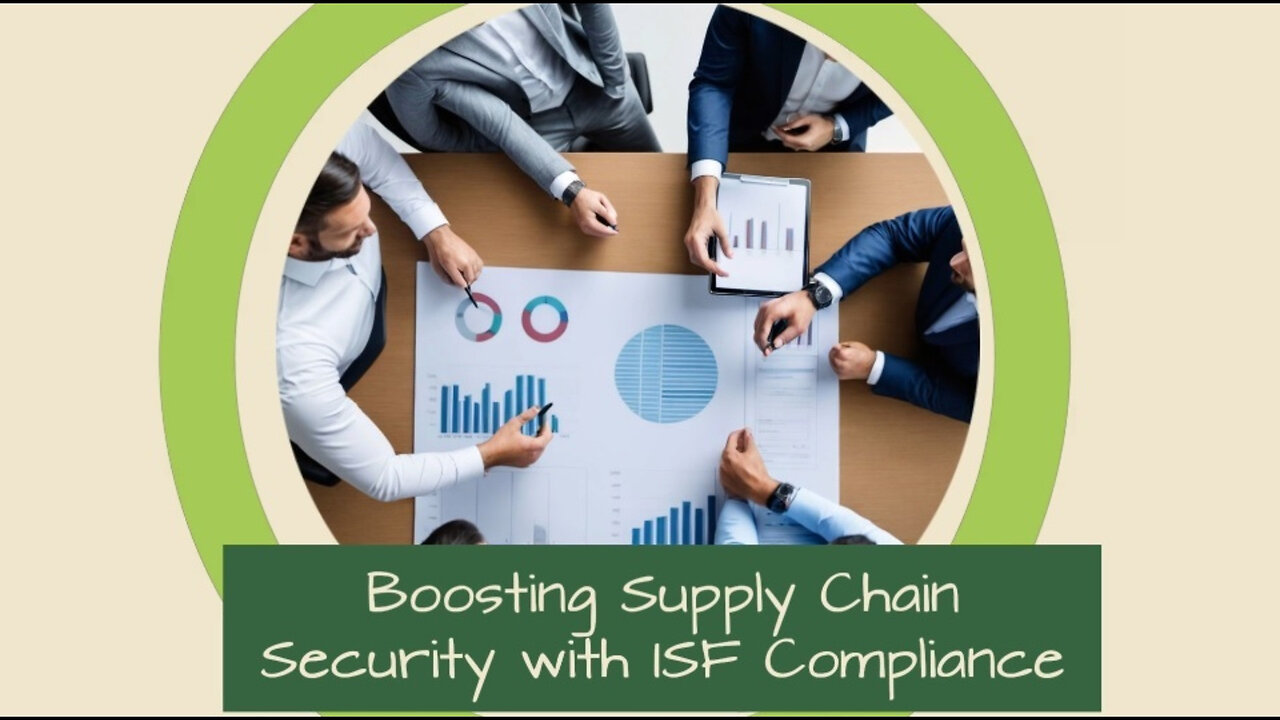Premium Only Content

Mastering Importer Security Filing: Enhancing Supply Chain Security Compliance
ISF Checklist || 805-970-7918 || contact@isfchecklist.com || www.isfchecklist.com
Importers have a responsibility to comply with Importer Security Filing (ISF) requirements to enhance supply chain security in international trade. ISF, also known as 10+2, requires importers to submit specific information about their shipments before they arrive in the United States. This information helps identify high-risk shipments and prevents potential threats from entering the country, while also facilitating legitimate trade. There are ten data elements that importers must provide, including buyer and seller information, consignee and manufacturer information, and the port of lading. Additionally, two data elements must be provided by other parties involved in the shipment, such as the container stuffing location and the consolidator. To avoid penalties and delays in customs clearance, importers must comply with the ISF timelines. The ISF must be filed no later than 24 hours prior to the vessel's departure from the last foreign port. Failure to meet this deadline can result in monetary penalties, cargo holds, or exclusion of the shipment from entering the United States. Compliance with ISF requirements contributes to supply chain security and strengthens the partnership between importers and U.S. Customs and Border Protection (CBP). It reduces the risk of inspection and facilitates the smooth flow of goods. In addition to compliance, ISF offers importers several benefits, including better supply chain visibility, proactive risk management, and reduced risk of penalties and delays. Collaborating with a trusted customs brokerage firm is crucial for managing ISF and ensuring overall compliance. Customs brokers have the knowledge and expertise to guide importers through the ISF process, complete accurate filings, adhere to timelines, and address any potential issues. Working closely with a customs broker enables smooth operations and minimizes the risk of non-compliance. Understanding the impact of ISF on supply chain security compliance is essential for importers in today's global trade environment, and partnering with a customs brokerage is key to navigating the ISF requirements effectively.
#usimportbond #isfcustomsbroker #uscustomsclearing #isfentry
Video Disclaimer Here: This video is purely educational and has no ties with the US government.
00:38 - ISF compliance is crucial for supply chain security in international trade, ensuring safe and efficient movement of goods.
1:08 - ISF requires importers to submit specific information before shipments reach the United States to enhance cargo security and risk assessment by CBP.
1:32 - Timely filing of ISF is essential to avoid penalties and delays, with strict deadlines for submission before the vessel's departure from the last foreign port.
2:59 - Partnering with a customs brokerage firm is key to managing ISF, ensuring compliance, and benefiting from improved visibility, proactive risk management, and smoother operations in the supply chain.
-
 1:05:28
1:05:28
Flyover Conservatives
18 hours agoUkraine’s Dirty Secret: The Christian Persecution No One Wants to Talk About - Alex Newman | FOC Show
29.4K10 -
 2:00:20
2:00:20
Glenn Greenwald
10 hours agoThe View from Moscow: Key Russian Analyst Aleksandr Dugin on Trump, Ukraine, Russia, and Globalism | SYSTEM UPDATE #414
87.4K35 -
 1:10:55
1:10:55
Donald Trump Jr.
7 hours agoBREAKING NEWS: My Father Revokes Biden-Maduro Oil License, LIVE with Maria Corina Machado | Triggered Ep.220
174K186 -
 1:25:29
1:25:29
Sarah Westall
6 hours agoX-Files True History, Project Blue Beam, Cabal Faction War w/ Former FBI Agent John DeSouza
64.9K5 -
 7:03:49
7:03:49
Dr Disrespect
13 hours ago🔴LIVE - DR DISRESPECT - NEW PC VS. DELTA FORCE - MAX SETTINGS
153K26 -
 49:04
49:04
Lights, Camera, Barstool
1 day agoIs The Monkey The Worst Movie Of The Year?? + Amazon Gets Bond
62.3K4 -
 24:19
24:19
Adam Carolla
1 day agoDiddy’s Legal Drama Escalates, Smuggler Caught Hiding WHAT? + Philly Eagles & The White House #news
90.8K16 -
 10:12
10:12
Mike Rowe
2 days agoClint Hill: What A Man. What A Life. | The Way I Heard It with Mike Rowe
106K10 -
 1:31:52
1:31:52
Redacted News
9 hours agoBOMBSHELL! This is war! FBI whistleblowers reveal Epstein files being destroyed? | Redacted News
176K370 -
 48:55
48:55
Candace Show Podcast
9 hours agoSTOP EVERYTHING. They FINALLY Mentioned ME In The Blake Lively Lawsuit! | Candace Ep 152
154K127